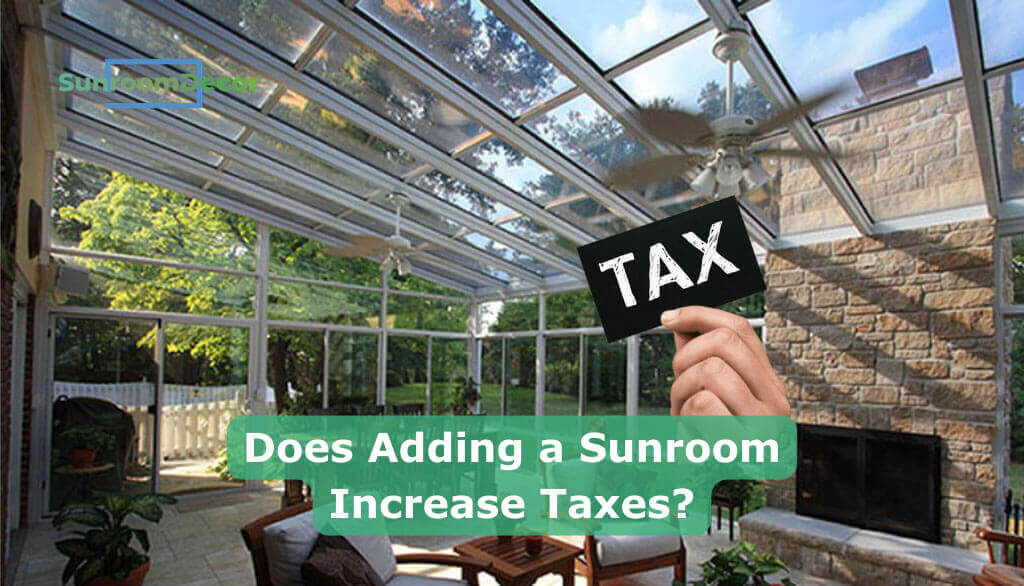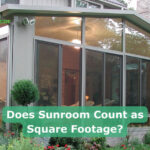Adding a sunroom to your home can be a great way to add extra living space and enhance the overall value of your property. However, many homeowners are concerned about whether adding a sunroom will increase their property taxes. In short, yes. Adding a sunroom will almost certainly increase your property taxes, but it will also increase your enjoyment of your home.

Property Tax Laws for Sunroom Additions
Property tax laws and regulations vary depending on your location, so it’s crucial to research and understand the laws in your area.
In general, adding a sunroom to your home will increase its assessed value, which can result in an increase in property taxes. However, the amount of increase will depend on several factors, including the size of the sunroom, the materials used, and the location of the property.
To clarify the property tax laws in your area, it’s essential to do your research. You can start by contacting your local government office or property tax assessor to find out how sunroom additions are assessed and taxed. You can also consult with a real estate agent or tax professional who is familiar with the laws in your area.
In some cases, you may be eligible for tax credits or exemptions for making energy-efficient improvements to your home, such as adding a sunroom with energy-efficient windows and insulation. These credits and exemptions can help offset the cost of any property tax increase resulting from the sunroom addition.
It’s also important to keep accurate records of any improvements or renovations made to your home, including the sunroom addition. This documentation can help you accurately calculate your property taxes and ensure that you’re not overpaying.
How Are Property Taxes Calculated?
The assessed value of your property is a significant factor in determining your property taxes. Assessed value is the value of the property as determined by a local government agency, such as a tax assessor. This value is based on factors such as the size and location of the property, as well as the value of comparable properties in the area.
The size of your property also plays a role in determining your property taxes. Generally, larger properties will have higher property taxes than smaller properties. This is because larger properties typically have more value and require more municipal services, such as trash and snow removal.
Improvements made to your property, such as adding a sunroom, can also impact your property taxes. Any improvements made to your property will increase its assessed value, which can result in an increase in property taxes. The amount of the increase will depend on several factors, including the cost of the improvements, the materials used, and the location of the property.
The regulations and guidelines regarding property taxes on sunroom additions vary by location in the United States. The International Code Council website provides Internal Building Code guidelines that most states adopt.
However, each location may tax the defined spaces differently. For example, California considers sunrooms as new and additional construction to the home, resulting in a reassessment of the newly constructed space based on its estimated market value.
On the other hand, Florida’s 2010 residential building code categorizes sunrooms as inhabitable space, such as storage or utility space, taxed at a lower rate than improved living space.
Regardless of how a sunroom addition is classified, it increases the square footage of the building on the property. Consequently, it adds value to the property, but the amount of the increase depends on the size and functionality of the constructed space.
The type of sunroom may also contribute to how it is taxed. For instance, if plastic windows are used instead of glass windows, the structures may not be classified as living space and may be taxed at a lower rate.
However, including features like electricity, heating, or air conditioning may cause the space to be taxed at a higher rate, as it is considered more habitable.
Ultimately, any addition that increases a property’s value may raise property taxes. The exact amount of the increase is determined by local taxing authorities.
Before constructing a sunroom addition, it is advisable to contact local officials to obtain an estimated assessment of the building plan to avoid unexpected tax bills.
Other factors that can impact property taxes include changes in the local tax rate and changes in the municipal budget. Municipalities can adjust the tax rate to account for changes in property values or to fund new services or projects.
Similarly, changes in the municipal budget can impact property taxes, as municipalities may need to increase taxes to cover the cost of new services or projects.
How Sunrooms Can Impact Your Property Value
One of the most significant factors that determine the impact of a sunroom on property value is the size of the sunroom. Larger sunrooms are generally more valuable and can increase a property’s value more than smaller ones.
Additionally, the quality of the sunroom is another critical factor. A well-built and well-maintained sunroom can significantly increase a property’s value, while a poorly built or damaged sunroom may have little or no impact on the property’s value.
The location of the sunroom can also impact the property’s value. For example, a sunroom that provides an excellent view or is located in a desirable part of the property can increase the property’s value more than a sunroom that is poorly placed.
Additionally, if the sunroom adds functional living space to the home, such as an additional family room or dining area, it can add significant value to the property.
It’s important to note that while a sunroom can increase a property’s value, it’s not a guarantee that the value will increase. The value that a sunroom adds to a property will depend on the local real estate market, the quality of the sunroom, and the preferences of potential buyers.
Additionally, if a sunroom is poorly built or does not blend well with the rest of the property, it may actually decrease the property’s value.
Tax Breaks and Exemptions for Sunroom Additions
While the tax implications of adding a sunroom vary depending on your location, there may be tax breaks or exemptions available to homeowners who make energy-efficient upgrades to their properties.
Here are some things to keep in mind when considering tax breaks for sunroom additions.
Research tax laws in your area
Before adding a sunroom to your home, it’s important to research the tax laws in your area. Some states or cities offer tax breaks or exemptions for home improvements that meet certain criteria, such as energy efficiency or eco-friendliness. By doing your due diligence, you can ensure that you take advantage of any tax incentives that may be available to you.
Consider federal tax credits
The federal government also offers tax credits for energy-efficient upgrades to homes, such as the installation of solar panels or windows. While sunrooms themselves may not qualify for these credits, if you make other energy-efficient upgrades to your home at the same time, you may be able to claim the credit.
Explore state-specific tax credits
In addition to federal tax credits, some states offer their own tax credits for energy-efficient home improvements. These credits may be based on the amount spent on the upgrade or the type of upgrade made. For example, the state of Maryland offers a tax credit of up to $5,000 for homeowners who make qualifying energy-efficient upgrades to their homes.
Consult with a tax professional
Tax laws can be complex and vary greatly depending on your location and circumstances. Consulting with a tax professional can help ensure that you take advantage of any tax breaks or exemptions available to you. A tax professional can also help you understand the potential tax implications of adding a sunroom to your home and any other home improvement projects you may be considering.
Minimize Property Tax Increases When Adding a Sunroom
Here are some practical tips to help you minimize property tax increases when adding a sunroom to your home.
Check your property tax assessment for accuracy
Before adding a sunroom to your home, make sure to review your property tax assessment to ensure that it accurately reflects the value of your home. If you believe that your assessment is too high, you may be able to appeal it and reduce your property taxes.
Keep the size of the sunroom within reason
While a large sunroom may be more spacious and comfortable, it may also increase your property taxes. To minimize the impact on your property taxes, consider keeping the size of the sunroom within reason and avoid building an oversized structure.
Opt for a budget-friendly sunroom design
There are many different types of sunroom designs to choose from, ranging from simple and budget-friendly to extravagant and expensive. Consider opting for a budget-friendly design that is both functional and aesthetically pleasing, without adding unnecessary features that could increase your property taxes.
Use the sunroom for multiple purposes
Instead of using the sunroom solely for relaxation or entertainment, consider using it for multiple purposes, such as a home office or guest room. This can help maximize the value of the sunroom without significantly increasing your property taxes.
Consult with a tax professional
If you’re unsure about how adding a sunroom will impact your property taxes, it’s always a good idea to consult with a tax professional. They can provide valuable advice and help you make informed decisions to minimize property tax increases when adding a sunroom to your home.
By following these practical tips, you can enjoy the benefits of a sunroom without worrying about a significant increase in your property taxes.
FAQs
Does adding a sunroom increase home value?
Adding a sunroom can increase home value, but the exact amount depends on various factors, such as the size, quality, and location of the sunroom.
Is a sunroom considered an addition?
Yes, a sunroom is generally considered an addition to a home.
Is a sunroom considered living space?
It depends on the local building codes and regulations. In some areas, sunrooms may be considered living space, while in others they may be classified as storage or utility space.
Is it worth building a sunroom?
It depends on your personal preferences and circumstances. A sunroom can increase the value of your home and provide a comfortable space for relaxation and entertainment, but it can also be expensive to build and maintain. Consider factors such as your budget, local weather conditions, and intended use of the space before deciding if a sunroom is worth building for you.
Conclusion
Adding a sunroom to your property can increase your property value and potentially your property taxes.
However, the exact impact on property taxes depends on various factors, such as the laws and regulations in your area, the size and quality of the sunroom, and the potential tax breaks or exemptions available.
Homeowners should consider these factors and take practical steps to minimize any potential property tax increases while enjoying the benefits of a sunroom.
Ultimately, consulting with a tax professional or local government agency can provide more specific guidance and ensure compliance with any applicable regulations.
References
International Code Council: Free Resources; Free Codes (Categorized by State)



